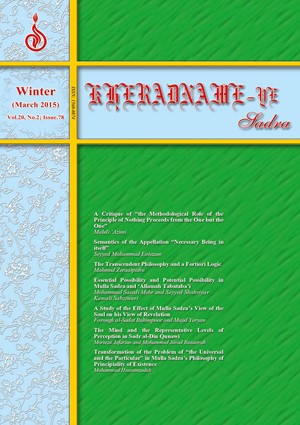-
-
List of Articles
-
Open Access Article
1 - سرمقاله
Seyyed Mohammad Khamenei -
Open Access Article
2 - A Critique of “the Methodological Role of the Principle of Nothing Proceeds from the One but the One”
Mahdi ‘Azimi -
Open Access Article
3 - Semantics of the Appellation “Necessary Being in itself”
Seyyed Mohammad Entezam -
Open Access Article
4 - The Transcendent Philosophy and a Fortiori Logic
Mahmud Zeraatpishe -
Open Access Article
5 - Essential Possibility and Potential Possibility in Mulla Sadra and ‘Allamah Tabataba’i
Mohammad Saeedimehr Seyyed Shahriyar Kamali Sabziwari -
Open Access Article
6 - A Study of the Effect of Mulla Sadra’s View of the Soul on his View of Revelation
Furugh al-Sadat Rahimpoor Majid Yaryan -
Open Access Article
7 - ذهن و مراتب واقع نمايي ادراك در انديشة صدرالدين قونوي
Morteza Jafarian Mohammad Javad Rezaeirah -
Open Access Article
8 - Transformation of the Problem of “the Universal and the Particular” in Mulla Sadra’s Philosophy of Principiality of Existence
Mohammad Hosseinzadeh
-
The rights to this website are owned by the Raimag Press Management System.
Copyright © 2017-2026







